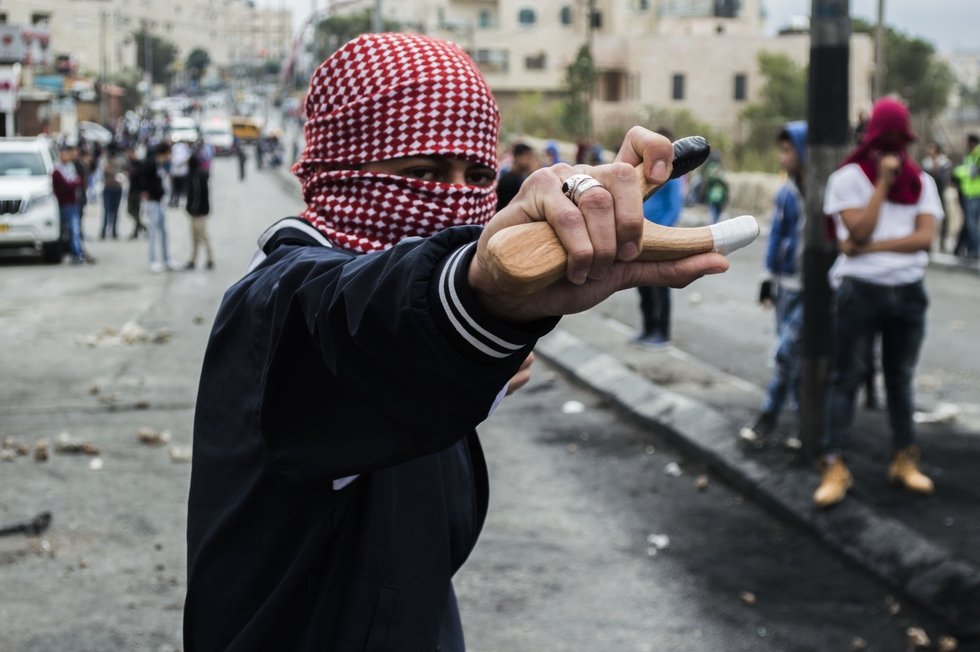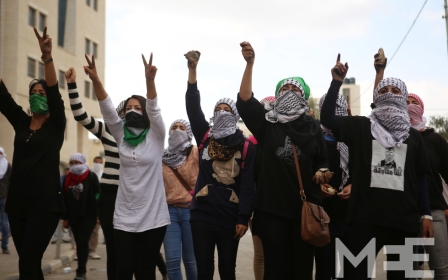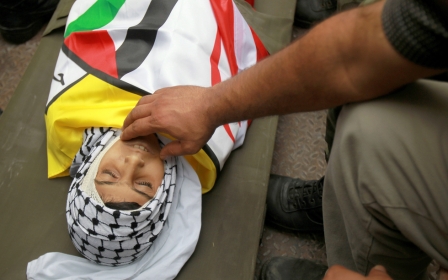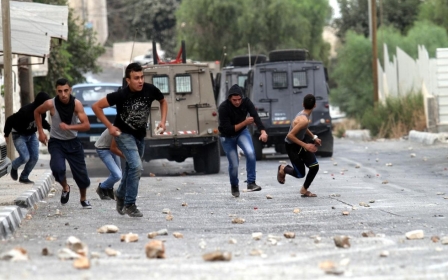Party politics irrelevant to Palestinian youth in new uprising

BETHLEHEM, West Bank - You can read the political leanings of a Palestinian neighborhood by the writing on the walls. Red swirls of Arabic calligraphy finished off by a sharp arrow pointing left outside of Abdel Aziz’s home marks him as a supporter of the Popular Front for the Liberation of Palestine (PFLP).
However, like most of the Palestinian youth who have taken to the streets during the past two weeks in the recent wave of clashes, his latest political activism has been separate from any factional pull.
The protests that have erupted across the Occupied Palestinian Territories have done so without the influence of their political parties, he said.
“Almost everyone is part of a party, or at least they support a party in Palestine, but that is something separate from what’s happening right now,” Aziz explained. “Right now we are going to the streets against the Israeli occupation in demand of our rights, we don’t need our parties for that, no one is talking about parties, this is an intifada from the people alone.”
Unrest in the region began more than two months ago, amid an increased allotment of time for right-wing Jews to tour East Jerusalem’s Al-Aqsa Mosque compound, venerated in Judaism as the holy Temple Mount. Palestinians saw the move as the beginnings of a plan by Israeli authorities to allow non-Muslim worship at the site.
However, tensions reached a breaking point on 1 October after suspected Palestinians shot and killed two Israeli settlers in the northern occupied West Bank, spurring settler revenge attacks against Palestinian communities that evening.
On 2 October clashes broke out across the West Bank and East Jerusalem and have continued to escalate daily. Palestinians attackers have killed four Israelis since the start of the month, while Israeli forces have killed more than 24 Palestinians.
The daily clashes and increased violence seems to be steadily increasing.
The children of Oslo
Aziz and his peers who have taken to the streets are part of the generation many are referring to as “the children of Oslo,” a generation of Palestinians who have lived their lives under promises of negotiations and peace processes, and who have little or no memory of their own of past intifadas.
Mustafa Barghouti, leader of the centre-left Palestinian National Initiative party told Middle East Eye that he’s observed a shift in this younger generation.
“This generation feels completely deprived from their rights; they suffer from poverty, unemployment and an utter lack of opportunity,” Barghouti told MEE. “I think the people in the streets feel they’ve crossed into a whole different stage. After 22 years of completely useless negotiations, they are taking things into their own hands.”
The young people who have led the recent upheaval across the occupied West Bank, East Jerusalem, Gaza and within Israel itself are aware of the political implications of their actions, Barghouti said, but by ignoring the current political process they are creating a new process of their own.
“What is happening with the young people right now is that they they are putting pressure on the political leadership to avoid any political manoeuvres that may try to abort this intifada,” he explained. “And they are applying a very serious pressure to end this terrible division between Palestinian parties and normal Palestinian life.”
Barghouti believes that instead of getting behind the political parties, the Palestinian youth are “pressuring the leaders to get behind them”.
The Fatah-led Palestinian Authority in the occupied West Bank has been clear that it does not support an uprising. Its stance is instead that negotiations and diplomacy, with the help of the international community, can eventually end Israel’s occupation of the Palestinian Territories.
The security spokesperson for the PA, Adnan Damiri, told MEE that while the PA supports the “people’s vision” in protesting against Israeli violations around the Al-Aqsa Mosque compound, it does not support an intifada.
“We are doing everything we can to stop an armed intifada because we tried that before and we paid dearly for it,” Damiri said.
George Abueed, 25, is a young activist who feels disillusioned by the current government, as well as the other political parties, all of which he believes are steeped in corruption and more concerned with personal advancement than ending the occupation.
“I don't think any party is interested in changing the status quo,” Abueed said. “They have gained enormous self-interests, especially the Fatah party, and the only way to maintain those interests is by maintaining the status quo.”
Abueed has taken part, sporadically, in the clashes that have erupted in his neighbourhood during the past 10 consecutive days. However, unlike most of the young people clutching rocks on the streets outside his home, Abueed does not believe the recent upsurge in clashes and attacks is the start of the third intifada.
Abueed believes Palestinians are simply not ready for the next intifada, as the recent protests have been “unorganised and spontaneous without a strategy and a clear goal”.
“What is needed at the moment is a united leadership that could plan and organise its political work on the ground and could press, with civil disobedience, for self-determination and liberation from the Israeli occupation,” he said. “Unfortunately the current leadership has nothing to offer to its people.”
Led by the youth
Muhammad Breijiya, a spokesperson for the PFLP, said his movement is working to create a kind of grassroots organisation amongst the protesters.
“We are trying to create one new group of leaders from all the parties that help can keep this intifada going,” Breijiya told MEE. “The new leaders have to be from the [refugee] camps, the villages and the cities, so that they represent all the communities in Palestine and so that we can affect change quickly during this intifada.”
Beijiya agrees that the protests are being led by youth who are not concerned with political manoeuvrings, so instead of being concerned with gaining any sort of control, Beijiya said the PFLP movement is looking to listen to the protesters and follow their lead.
“What we are seeing is coming from the people not the parties,” Beijiay said. “Only the people can create an uprising like this and the parties must listen to them.”
The Hamas party has perhaps been the most vocal in not just supporting, but pushing for the third intifada.
Khalid Tafish, a Hamas representative in the Palestinian Legislative Council, told Middle East Eye that any party trying to control the protesters will fail.
“These are teenagers, they aren’t strictly aligned with political parties, they are normal people, they are kids, but they are the ones fighting against the occupation, and that fight is their only concern,” Tafish said. “They don’t care about parties.”
“Right now if this continues the parties will have to find their way to catch up with the youth in order to participate in the next uprising,” he said.
New MEE newsletter: Jerusalem Dispatch
Sign up to get the latest insights and analysis on Israel-Palestine, alongside Turkey Unpacked and other MEE newsletters
Middle East Eye delivers independent and unrivalled coverage and analysis of the Middle East, North Africa and beyond. To learn more about republishing this content and the associated fees, please fill out this form. More about MEE can be found here.




